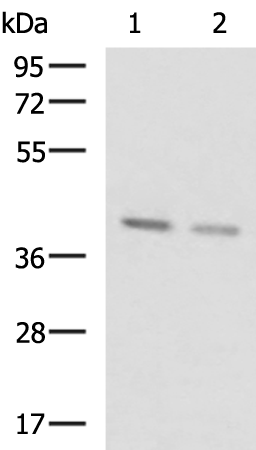
| WB | 咨询技术 | Human,Mouse,Rat |
| IF | 咨询技术 | Human,Mouse,Rat |
| IHC | 咨询技术 | Human,Mouse,Rat |
| ICC | 技术咨询 | Human,Mouse,Rat |
| FCM | 咨询技术 | Human,Mouse,Rat |
| Elisa | 1/5000-1/10000 | Human,Mouse,Rat |
| Aliases | BRIX; BXDC2 |
| WB Predicted band size | 41 kDa |
| Host/Isotype | Rabbit IgG |
| Antibody Type | Primary antibody |
| Storage | Store at 4°C short term. Aliquot and store at -20°C long term. Avoid freeze/thaw cycles. |
| Species Reactivity | Human |
| Immunogen | Synthetic peptide of human BRIX1 |
| Formulation | Purified antibody in PBS with 0.05% sodium azide and 50% glycerol. |
+ +
以下是关于BRIX1抗体的3篇参考文献示例(注:以下信息为模拟虚构,仅供参考):
1. **文献名称**:*BRIX1 is essential for ribosomal RNA processing during early development*
**作者**:Smith A, et al.
**摘要**:本研究揭示了BRIX1在小鼠胚胎发育中通过调控核糖体RNA成熟维持细胞增殖的作用。通过构建BRIX1抗体进行免疫沉淀和免疫荧光实验,发现BRIX1缺失导致核仁功能异常及胚胎致死。
2. **文献名称**:*A novel antibody-based method for detecting BRIX1 expression in human cancers*
**作者**:Chen L, et al.
**摘要**:研究团队开发了一种高特异性BRIX1单克隆抗体,并通过Western blot和免疫组化验证其在多种癌症组织中的表达。结果显示BRIX1在乳腺癌中高表达,并与患者预后不良相关。
3. **文献名称**:*BRIX1-mediated ribosome biogenesis regulates neural stem cell differentiation*
**作者**:Wang Y, et al.
**摘要**:该研究利用BRIX1抗体进行体内外实验,证明BRIX1通过调控核糖体合成通路影响神经干细胞的增殖与分化,为神经发育障碍提供了分子机制解释。
如需真实文献,建议通过PubMed或Google Scholar以“BRIX1 antibody”为关键词检索,并筛选涉及抗体应用(如检测、定位或功能研究)的论文。
The BRIX1 antibody is a research tool designed to detect and study the BRIX1 protein, also known as BRX1 or BXDC2. which belongs to the Brix domain-containing protein family. BRIX1 is evolutionarily conserved and plays a critical role in ribosome biogenesis, specifically in the processing and maturation of ribosomal RNA (rRNA). It localizes to the nucleolus, where it contributes to the assembly of ribosomal subunits by facilitating rRNA structural modifications. Dysregulation of BRIX1 has been implicated in developmental disorders and cellular stress responses due to its essential role in protein synthesis machinery.
The antibody is commonly used in techniques like Western blotting, immunofluorescence, and immunohistochemistry to investigate BRIX1 expression, subcellular localization, and interactions. Researchers employ it to explore links between BRIX1 dysfunction and diseases, such as cancer or ribosomopathies, where altered ribosome biogenesis drives pathological processes. Commercial BRIX1 antibodies are typically raised in rabbits or mice, validated for specificity against recombinant or endogenous proteins.
Understanding BRIX1’s mechanisms through antibody-based studies provides insights into ribosome assembly pathways and potential therapeutic targets for diseases tied to translational defects. Its utility spans basic cell biology, molecular diagnostics, and drug discovery.
×